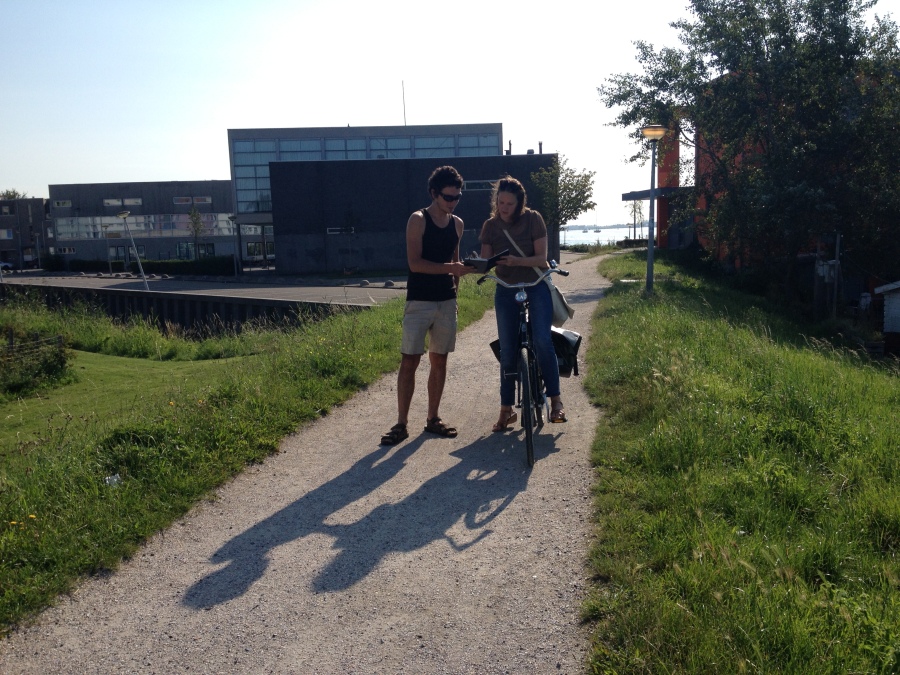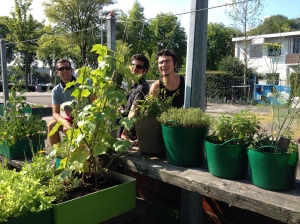 In August 2014, I met 3 French agronomy students from Montpellier University cycling through Europe to examine urban agriculture trends and innovations. We met to discuss Amsterdam’s Food Vision and to visit the garden I volunteer in (Curious Finch). While I don’t usually write about travel stories (save for urban interesting planning/ sustainability strategies…) their story is inspiring and I wanted to share.
In August 2014, I met 3 French agronomy students from Montpellier University cycling through Europe to examine urban agriculture trends and innovations. We met to discuss Amsterdam’s Food Vision and to visit the garden I volunteer in (Curious Finch). While I don’t usually write about travel stories (save for urban interesting planning/ sustainability strategies…) their story is inspiring and I wanted to share.
In France, students usually conduct an internship during the final year of studies. Simon Ronceray, Etienne El Bideau and Yoann Durrieu however had other plans. A year before this internship period, they started planning a long distance cycle trip across Europe to witness firsthand the growth, scale and variation of urban agriculture in European cities. They contacted the necessary university departments to ensure that they would receive credit for this endeavor and adequate supervision. They created a website: Agrovelocites. They found sponsors, including UNESCO, several municipal governments, and received supplemental funds through crowdfunding. They were gifted bicycles and equipment. They planned their route – but left enough to be discovered along the way. They said goodbye, and hopped on their bikes.
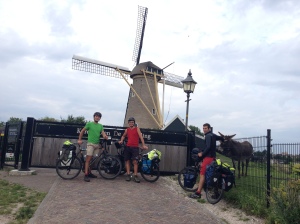 In January when the weather was still cool and the fields dormant, Simon, Etienne and Yoann left France, traveling west to Spain and Portugal. They cycled back through Spain towards France, exploring their own country in a new perspective. Next they continued east and south, cycling through Italy and the Balkans: Slovenia, Croatia, Bosnia and Herzegovina, Serbia, Montenegro, Albania, Macedonia, Greece and Bulgaria. After this they headed north and west: through Romania, Hungary, Slovakia, Poland and Germany. From Germany, they cycled to the Netherlands, visiting the Dutch cities of Wageningen (my university town) and Utrecht. I met them next in Amsterdam, before they continued on to Den Haag and Rotterdam, and south towards Belgium. (Check their route.) In mid-August, they returned to Paris, arriving to a celebration filled with family and friends – and I’m sure there was plenty of delicious, local and organic food to celebrate. It’s France after all!
In January when the weather was still cool and the fields dormant, Simon, Etienne and Yoann left France, traveling west to Spain and Portugal. They cycled back through Spain towards France, exploring their own country in a new perspective. Next they continued east and south, cycling through Italy and the Balkans: Slovenia, Croatia, Bosnia and Herzegovina, Serbia, Montenegro, Albania, Macedonia, Greece and Bulgaria. After this they headed north and west: through Romania, Hungary, Slovakia, Poland and Germany. From Germany, they cycled to the Netherlands, visiting the Dutch cities of Wageningen (my university town) and Utrecht. I met them next in Amsterdam, before they continued on to Den Haag and Rotterdam, and south towards Belgium. (Check their route.) In mid-August, they returned to Paris, arriving to a celebration filled with family and friends – and I’m sure there was plenty of delicious, local and organic food to celebrate. It’s France after all!
From January through August, they visited hundreds of gardens, large and small, changed numerous flat tires and enjoyed countless meals with strangers turned to friends. They conversed with students and academics, grandmothers and grandchildren, professional farmers and volunteer gardeners. And it wasn’t just experts or urban agriculturalists they spoke to. They spoke with people… on their bikes, walking their dogs, in the café. In this way they learned what average citizens know, think about, and if/ how they engage in urban agriculture. I was pleasantly surprised by the responses we received on the level of knowledge, interest and engagement regarding urban agriculture and local food choices in Amsterdam. From these interactions, they received new ideas and witnessed the dedication and commitment of urban agriculturalists. I loved the story of the passionate grandmother and her love of local vegetables in Spain, or the pizza garden in Germany. Inspired by their project (and yes, their adventure) I tagged along to several gardens in Amsterdam Noord. After all, it’s my research! We visited a Food Bank Garden (to ensure food banks also have fresh and healthy foodstuffs), a local food restaurant, a school garden, and met local food entrepreneurs producing mushrooms and herbs. Filled with inspiration, I cycled with them to Den Haag before returning to the PhD paper writing.
In 7 months, they cycled 12,000 kilometers. It’s hard to summarize this journey in a few words, but one statement caught my attention: bicycles and urban agriculture belong together. I may not cycle as far to my community garden for a tomato or carrot, but I do agree: the (city) cycling community and urban agriculturalists are often the same. Eat healthy, stay fit. And, when traveling by bike: you don’t buy in bulk; you pick what you need… this results in less waste (especially in a community garden with shared crops) and less effort on the bike ride home. Perhaps this is incentive for my (hopefully soon) post-PhD life: a cycle ride across Europe or Asia, in search of the perfect tomato….
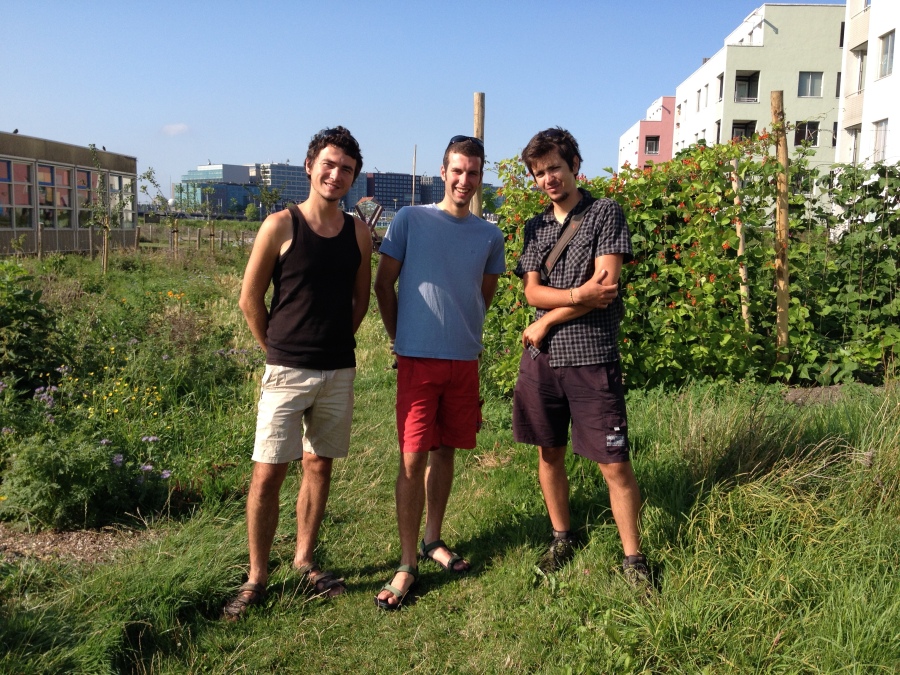
- Visiting Voedsetuin Ijplein or the “Food Bank Garden” in Amsterdam Noord with Etienne, Simon and Yoann (left- right)
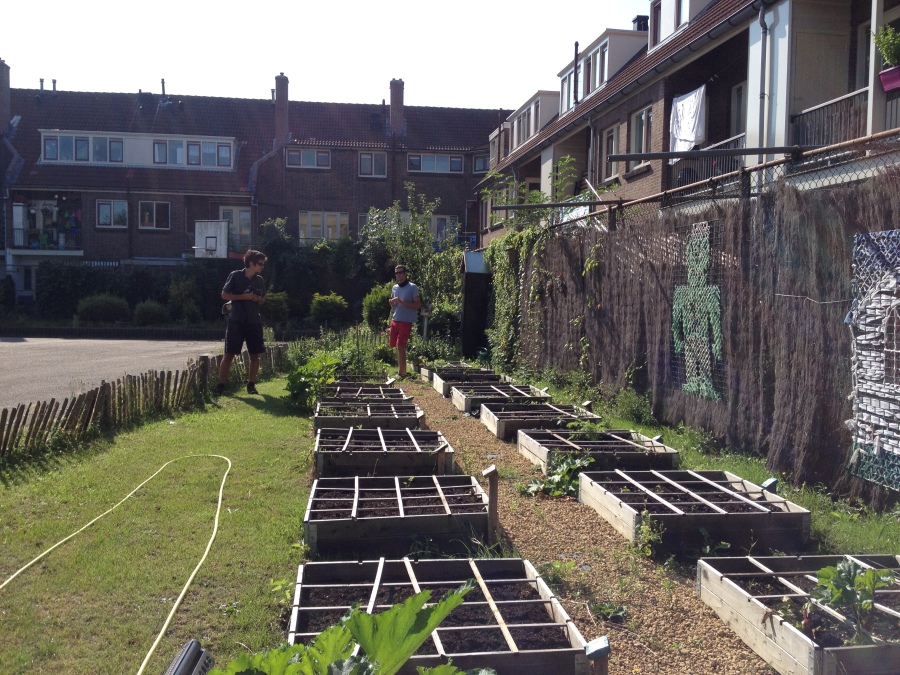
- We visited an after-school programme garden. The teacher explained to us that circa 15 children are responsible for a square garden for circa 10 weeks, after which they harvest the square and together the children cook the food that they grew. They can do this roughly 3 times per growing season and there is always a long list of eager students. Sign me up!
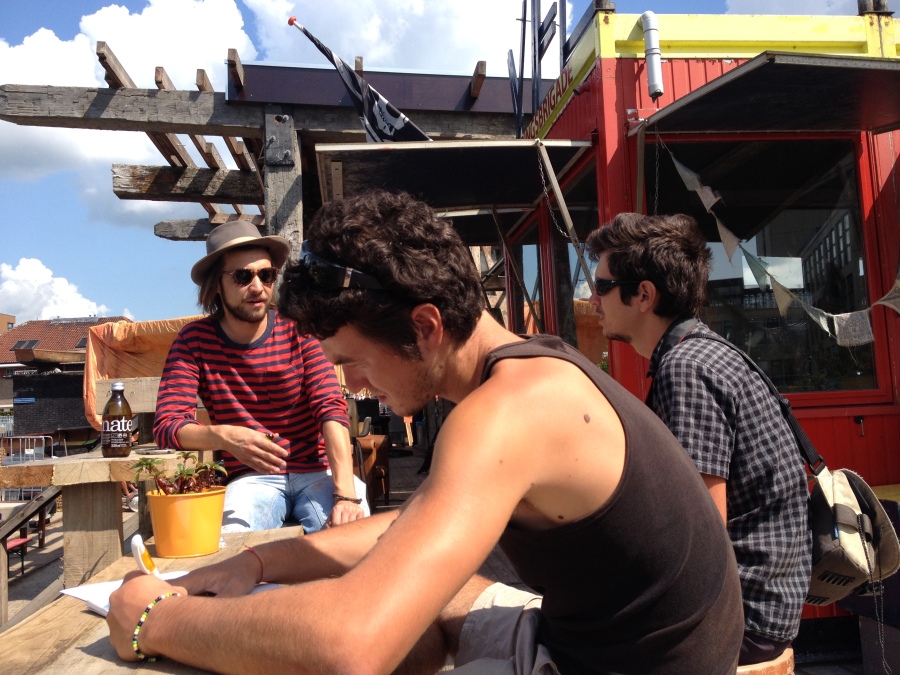
- Informal meeting at “Café de Ceuvel” – one of Amsterdam’s latest and funkiest new bar/ restaurants made of recycled and recovered materials (e.g. surrounding offices from decommisioned houseboats) and with onsite renewable energy production, food composting and local herb/ vegetable production. What they don’t grow on site, comes from farmers in the vicinity. Of course, sustainability is also about style: the music is good, the location is great (on the water) and the beers are cold. One of my new favorites!

